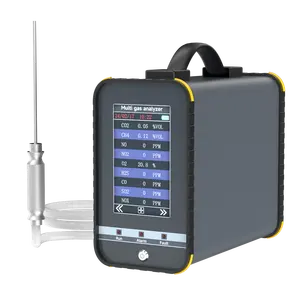

Combustible Ch4 Gas Detector Highly Sensitive Detection HD LCD Color Screen Display Sound Analog Bar Double Alarm Gas Analyzer


S360 Portable Biogas Analyzer Emission Methane Flue Multi Gas Detector Measuring Instruments Analyzer






A gas detector represents a significant device in safety and health. It detects the presence of gases in an area, often as part of a safety system. This equipment detects a gas leak or other emissions and can interface with a control system to shut down a process automatically. Additionally, a gas detector can alarm operators in the area where the leak is occurring, allowing them to leave. It is essential for safety reasons when used in homes, offices, and many industrial environments. Many industries, including petroleum and natural gas, chemicals, food and beverage, water treatment, and sewage treatment, utilize these detectors for safety. Detection of toxic and combustible gases and oxygen depletion is a common application. High reliability, accuracy, and simple calibration of gas detectors ensure efficient operation.
Gas detectors are widely used in various sectors. They are commonly found in industries such as oil refineries, waste treatment plants, and chemical labs where the risk of gas leaks is high. In such settings, detectors like the sewer gas detector and the gas monitor are often used. In addition to industrial use, gas detectors are essential for residential neighborhoods. The gas detector for home is a standard household device that ensures safety from potential gas leaks.
Gas detectors have numerous features that make them indispensable safety tools. For example, the airthings radon detector is known for its high sensitivity and accuracy in detecting radon levels. The CO monitor detects carbon monoxide and displays its concentration levels. The safe t alert RV propane alarm is another unique gas detector designed specifically for RVs. It alerts the users about propane leaks, ensuring safety during travels. Some sensors, such as the gas sniffer, have a visual interface that indicates the presence and concentration of gases.
Gas detectors are typically made of durable materials to withstand harsh environments. For instance, the ventis MX4 and the altair 4XR are known for their rugged construction. Additionally, catalytic sensors, commonly used for detecting combustible gases, contain a heated element that ignites the gas, triggering the alarm. Each material serves a specific purpose in gas detection, ensuring safety in various environments. The choice of materials is crucial to the efficiency and accuracy of gas detectors, making ongoing research and development in this area vital.
One of the main advantages of gas detectors is their ability to provide early warnings in case of gas leaks, thereby preventing potential disasters. Some sensors, like the radon monitor, the radon gas detector, and the helium leak detector, can even provide real-time updates on gas levels, allowing for immediate action.